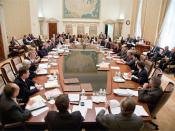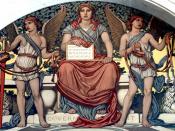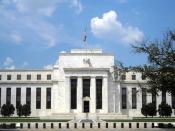U.S. Monetary Policy
In looking at the effectiveness of Monetary and Fiscal policies, it must be understood how the two relate to each other within the government structure. The Federal Open Market Committee - FOMC - is the most important monetary policy-making body of the Federal Reserve System. According to our text, Colander (2004) states, it is responsible for formulation of a policy designed to promote economic growth, full employment, stable prices, and a sustainable pattern of international trade and payments. The seven Board members constitute a majority of the 12-member Federal Open Market Committee, the group that makes the key decisions affecting the cost and availability of money and credit in the economy. The other five members of the FOMC are Reserve Bank presidents, one of who is the president of the Federal Reserve Bank of New York. The Board sets reserve requirements and shares the responsibility with the Reserve Banks for discount rate policy.
The FOMC is the policy arm of the Fed and the tasks of the Federal Reserve are to supervise banks, fixing maximum rates of interests.
The U.S Treasury, though it aids in much of the monetary management, represents the fiscal sector, which is the U.S Congress. Fiscal policy covers, such areas as taxation and other revenue gathering and spending measures. Fiscal policies are those actions that are enacted by the Legislative Branch of the U.S government, the Congress. Their fiscal policies are enacted through the U.S Treasury. Therefore, the Treasury is the arm of fiscal policy and the Federal Reserve is the arm of monetary policy. For example, even if Congress has allocated some amount of money to take over failing banks and savings and loans, and it is not enough, than the Fed can pump capital into the system by buying...


